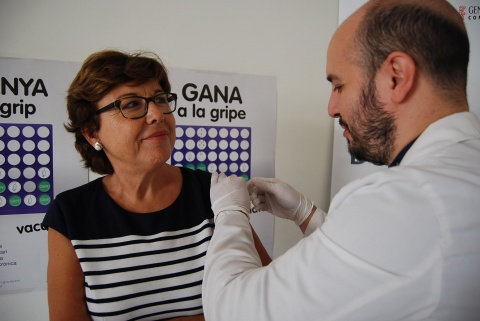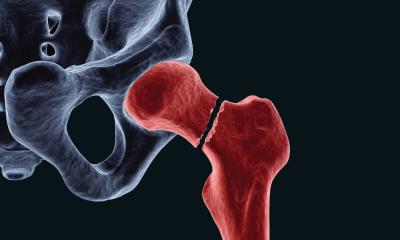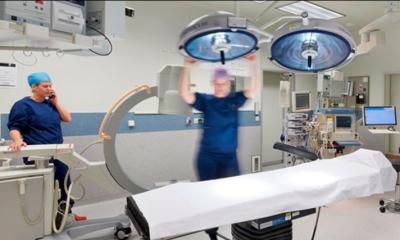Article • Joining strengths
Vaccination and infection control: Two pillars of prevention
Synchronised efforts between preventive medicine and immunology enable powerful vaccination strategies in a Spanish seniors hub.
Report: Mélisande Rouger

Efficient prevention also comes with proper infection control and regulating antibiotics use in primary care, local expert in preventive medicine explained in an exclusive interview with EH.
Working in a small structure has its perks, one of which is that departments can join strengths easily on many occasions, according to Antonio Valdivia, head of the Preventive Medicine Department at Denia Hospital in the Valencian Community. ‘Having everything under one roof enables us to do everything,’ he said. When it comes to cooperation, Denia’s preventive medicine and immunology departments have quite a successful track record, which culminated with the launch of a campaign on pneumococcus vaccination last year. ‘When preventive medicine is combined with immunology, vaccination strategies can be implemented. We are more determined to vaccinate sick or immunosuppressed patients. Pneumococcus infection causes one out of three pneumonias, recent studies have shown, so it’s important to fight bacteria which have such a huge disease burden,’ Valdivia pointed out.
Recruiting patients from primary care

His department first asked to access databases of patients under immunosuppressive treatment, which makes them particularly vulnerable to pneumococcal infections. The Spanish doctors then crosschecked if these patients had received appropriate pneumococcus vaccination – and if not, initiated the process. ‘We have been identifying patients and checking their antecedents for about a year and a half. We’ve been recruiting patients directly from primary care to vaccinate them against pneumococcus,’ Valdivia said. The strategy has brought results: out of a 160,000-population in the Denia area, 2,000 individuals have been vaccinated just by cross-checking risks. Annual tests measuring pneumococcus infection in the region revealed a 15% decrease in the number of cases since the campaign started.
Such initiatives can prove effective in areas with high densities of seniors, as they are more prone to develop bacterial infections with life-threatening and expensive outcomes. With its idyllic weather, the Valencian community is a hub for retired Europeans; it also has low birth rates, as a consequence of the financial crisis. This combination is an extra squeeze on already drained resources, Valdivia explained. ‘We have a lot of elderly foreigners and overall population, and they consume a lot of healthcare resources. Birth rate is low and we don’t have enough young people to take care of our senior patients. Our budget is low because of significant cuts started in 2007, so we have to find creative and efficient solutions to care for our patients,’ he pointed out.
Twenty years ago, a significant portion of our vaccines used the very viruses or bacteria we vaccinated against
Antonio Valdivia
A major pitfall in Spain is that healthcare professionals tend to refrain from vaccinating vulnerable, immuno-depressed populations, based on out-dated knowledge, according to Valdivia. ‘Twenty years ago, a significant portion of our vaccines used the very viruses or bacteria we vaccinated against. But now most vaccines use a completely different formula. Unfortunately the majority of people, including healthcare professionals, are not aware of that,’ he said.
Information systems, and particularly the electronic patient record, have enabled to improve hygiene and infection control, two main axes of preventive medicine. ‘The electronic patient record is a powerful tool and increasingly enables us to include all patient data – lab results, vital signs, and so on,’ he said. ‘It’s a great resource to carry out clinical trials and improve infection surveillance in the same region.’ The Denia Hospital team uses patient listings, in which it updates infection status across the community, highlights any potential antibiotic resistance and triggers appropriate chain of actions – change of treatment plan, identification of infection sources (catheter, etc.) and raising the alarm if necessary.
Managing antibiotics use
Recently, Valdivia has noticed a significant increase in multiresistant bacterial infections, especially those acquired inside the hospital. ‘Nosocomial infections have multiplied by three in my department over the past two years. We have also seen many cases of multiresistant bacterial infections in patients who came from retirement homes,’ he observed. Training professionals appropriately, directly in a hospital and retirement homes, is key to manage infections properly, Valdivia believes.
Another clear trend he identifies is multiresistant bacteria infection in patients who have received high spectrum antibiotics in the three months prior to the infection, a common scenario in urinary tract infection treatment. ‘We are now coordinating our efforts with the infection committee, pharmacies and hospital management systems to try and regulate antibiotics use.’ Their main objective is to reduce the administration of fluoroquinolonas, a commonly prescribed antibiotic, to only absolutely necessary cases, as they found out it was responsible for more than 30% of resistance cases.
Another antibiotic Valdivia does not recommend to treat urinary tract infections is Amoxicillin, unless lab tests strongly indicate so. Fosfomicinas, an antibiotic developed in Spain, could be an ideal alternative, according to Valdivia, who plans to push the idea directly at general practitioners. ‘We are getting serious about antibiotics control in primary care. About 80% of our patients with multiresistant bacterial infections have been treated with fluoroquinolonas or Amoxicillin – and in many cases, this was totally unjustified,’ he concluded.
Profile:
Antonio Valdivia, head of preventive medicine at Denia Hospital in Spain, specialised in immunology at Hospital Clinico San Carlo in Madrid, Spain, and in preventive medicine and public health at Madrid Community’s teaching unit focused on those fields. He holds a master’s degree in patient safety and quality assistance and a postgraduate degree in investigation methodology.
05.03.2018











